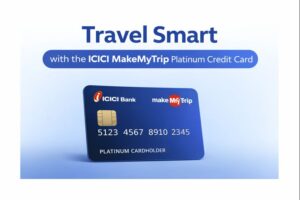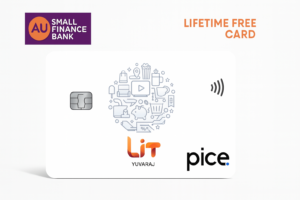Credit Card Advantages and Disadvantages: Should You Get One?
- 23 Oct 25
- 10 mins
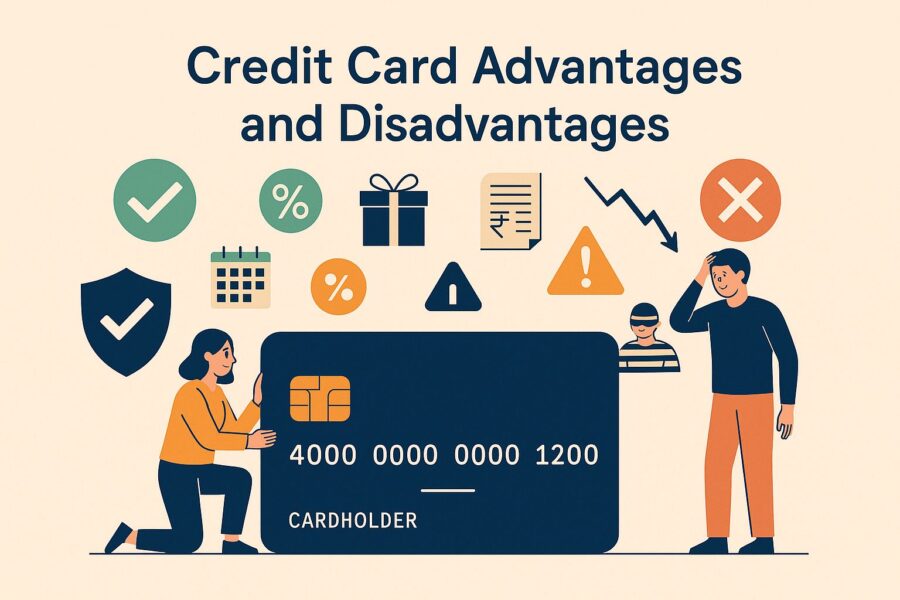
Credit Card Advantages and Disadvantages: Should You Get One?
Key Takeaways
- They let you manage both planned and unplanned expenses with the “buy now, pay later” feature, providing short-term liquidity without immediate cash outflow.
- Timely payments and consistent usage can help improve your credit score, making you eligible for better loan terms in the future.
- From cashback on groceries to travel perks and milestone rewards, credit cards can turn regular spending into valuable benefits.
- Overspending, missing due dates, or misunderstanding the “minimum due” amount can result in high-interest charges and negatively impact your credit score.
- To truly benefit from credit cards, users must be aware of hidden fees, indirect charges, and the repayment structure to avoid falling into debt traps.
Did you know that credit cards have come a long way in India since the Central Bank of India launched the country’s first credit card known as Centralcard in 1980? Once considered a privilege of the elite, credit cards have now become a mainstream financial tool where around 7.6 lakh new issuances recorded in May 2025 alone.
They offer unmatched convenience, reward programs, and flexible EMI options. However, misusing such a card can quickly lead to overspending and mounting interest charges. Read on to explore the credit card advantages and disadvantages to make an informed decision before applying.
Top 7 Advantages of Credit Cards for Smarter Spending
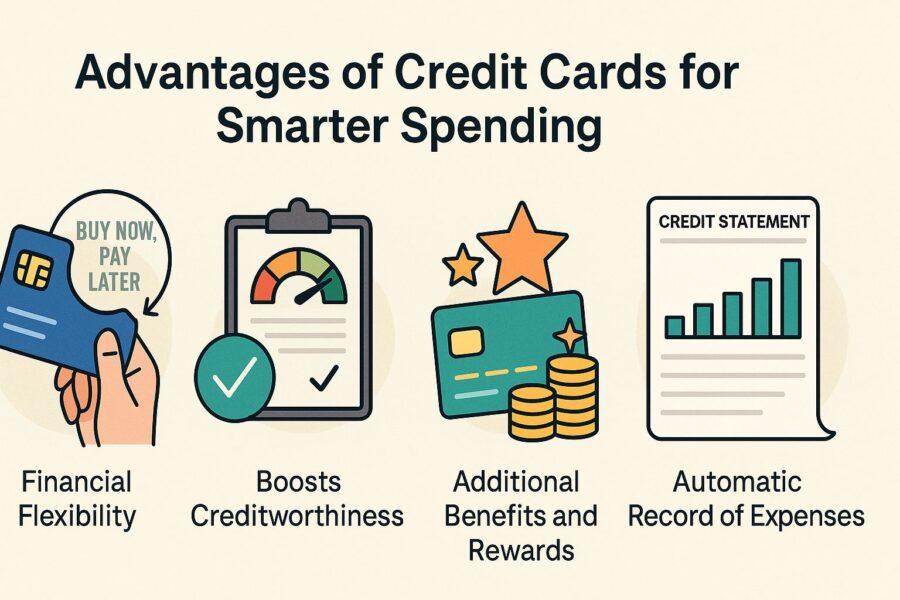
- Financial flexibility with Credit Access
Providing easy access to credit is the main function of credit cards. You can use the "buy now, pay later" feature on credit cards to manage both planned and unplanned expenses within your credit limit.
- Greater Interests
Every time you pay, your bank balance depletes, and you receive the interest on the remaining balance. However, using a credit card for general expenses helps to keep your money intact in your account and earn the full amount of interest on it.
- Boosts your Creditworthiness
Using credit cards and making timely repayments helps build a line of credit, which in turn boosts your credit score and enables you to achieve an optimal score of 750 or above. Moreover, banks and financial institutions consider card usage and credit history as significant factors in gauging your creditworthiness. Regular transactions and a record of timely payment can make you eligible for greater loans in future.
- Facility of EMI Payments
A credit card allows you to purchase items on credit with an EMI option. It will enable you to pay your EMIs without fail, as your bank offers a credit limit after subtracting your EMI amount.
Moreover, many banks, such as Axis Bank, HDFC Bank, SBI, and Yes Bank, offer no-cost EMI on credit cards. Using them can be more economical than getting personal loans for those purchases.
- Interest Free Credit
Many banks offer interest-free periods on credit. This means you can make credit purchases without incurring any interest charges. Generally, the credit period ranges from 20 to 55 days, depending on your card issuer’s policy. The credit period begins at the end of the billing cycle and lasts until your next payment due date.
- Additional Benefits and Rewards
Most credit cards offer incentives and rewards for using the credit card for various types of expenses. You can earn direct cash back on various general expenses, such as groceries and fuel. Moreover, you can also earn reward points on a rewards credit card to redeem multiple benefits, including travel and stay incentives.
- Automatic Record of Expenses
When you use a credit card for general everyday expenses, the record of all those expenses gets saved in the system. You can view those details in your credit card statement. Having an organised record of expenses can help you manage your costs and set a monthly budget.
💡Boost your credit score with timely payments using the PICE App for credit card bill payments.
7 Disadvantages of Credit Cards That Could Impact Your Financial Health
- Overspending
Credit cards generally offer cards with a high credit limit. There can be instances when you spend more than you can afford and ultimately cannot pay the due amount on time. Statistics from The Indian Express show that faults on credit cards with a credit period of 91 to 360 days have surged to 44.34%, from ₹23,475.6 crore to ₹33,886.5 crore, in the financial year 2024-25.
Hence, it is crucial to monitor your payback capacity and keep spending under control.
- Minimum Due Trap
Often, credit card users fall for a common misconception and spend more. People often tend to believe that the “Minimum Due” on a credit card is the actual amount they owe. Whereas it is the least amount that credit card users must pay to keep using the card.
This misconception often causes people to overspend beyond their capacity.
- Hidden Expenses
Credit cards can appear profitable from above; however, you must read the terms and conditions of the issuer and the card before getting one.
Many times, credit cards can incur indirect expenses in the form of taxes, late payment fees, joining fees, renewal fees, and processing fees.
- Negative Impact on Credit Score
Just like using a credit card responsibly can boost your credit score, missing due dates and repeated late payments can negatively impact your credit score, and a bad credit history can reduce your credibility for loans.
- High Interest Rates
Generally, credit cards offer a grace period during which interest is not charged. However, failing to meet the payment due date can result in high interest rates of 2.49% to 3.40%, which translates to an annual interest rate of 29.88% to 40.80%*.
- Credit Card Frauds
In 2025, banks reported 13,516 cases of fraud involving internet and card transactions. Although the number of cases decreased by 53.5% compared to FY24, there remains a minor chance of fraud and financial loss.
Various technological practices, such as tokenisation, OTP, and Additional Factor Authentication (AFA), are being implemented to help prevent these frauds.
The rates given are different from issuer to issuer and are subject to change.
Types of Offers and Rewards Available on Credit Cards
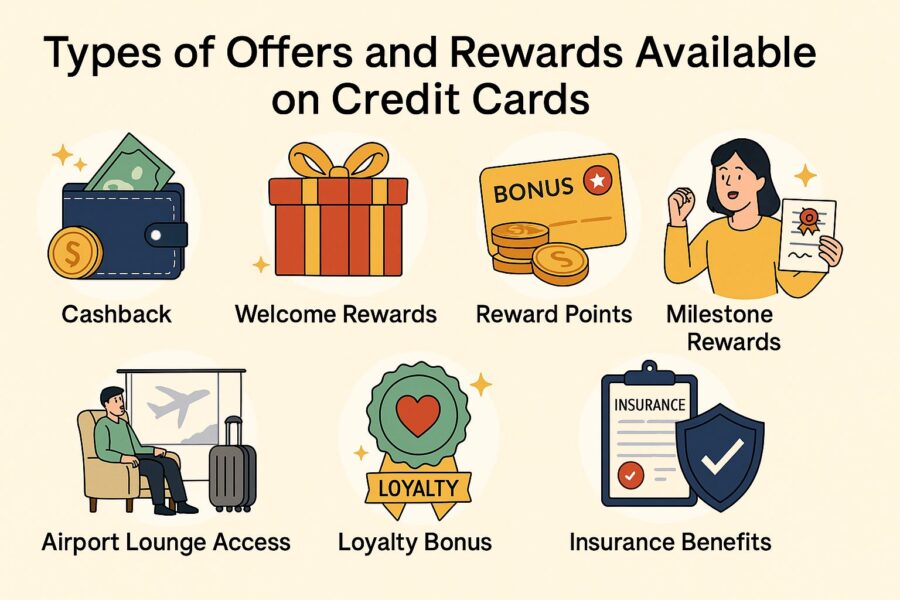
In terms of offers and rewards, credit cards generally provide direct cash back on transactions or offer reward points that users can redeem for rewards of their choice. Here are some additional benefits you generally get on credit cards.
- Cashback: Many banks offer cashback credit cards that mainly provide cashback on everyday expenses, such as groceries, fuel, and dining. This can be a great option if your financial aim is to increase savings.
- Welcome Rewards: Banks often provide bonus rewards to new customers as a welcome offer. For example, Axis Bank gives EDGE Reward points of ₹ 1,000 if you make any transaction within 30 days of receiving the card.
- Reward Points: You accumulate reward points when you use your credit card. Several banks give bonus reward points on certain expenditures, as a function of the issuing bank.
- Airport Lounge Access: Airport lounge access is a well-liked benefit found on a rewards credit card. Banks provide free lounge access to their clients based on their own terms and conditions.
- Loyalty Bonus: You can take advantage of a loyalty bonus when you are renewing your credit card from the same issuing bank. The issuer provides this as a token of appreciation to their clients.
- Milestone Rewards: Most credit card companies also provide extra reward points or some other reward for crossing a spending milestone. For instance, Axis Bank gives 1,500 EDGE REWARD points for spending ₹30,000 in a statement cycle.
- Insurance Benefits: You can spend your reward points to buy insurance coverage. Mostly, travel insurance policies and coverages are available on rewards credit cards.
Things to Consider When Using a Credit Card
Here are some insightful tips and tricks you can use to avoid the disadvantages of credit cards while enjoying their benefits.
- Keep track of your expenditures and calculate your payback capacity periodically. You can view your credit card expenses on the issuing bank’s website or the bank app.
- Segregate your general and occasional expenditures into separate transaction modes. Spending all your money on a credit card can suddenly increase your bill.
- Choose EMI options instead of one-time credit card payments.
- Compare the advantages and disadvantages of credit cards among various card issuers before choosing your issuing bank.
- Try to keep 40-50% of your credit limit for emergency purposes.
- Avoid impulsive purchases on a credit card.
- Avoid exceeding your credit card payment due date. Interests and fees can accumulate, leaving you in a debt trap.
- Be aware of the indirect charges and interest rates on your credit card.
Who Should Consider Getting a Credit Card and Who Shouldn’t?
Used wisely, a credit card can be a helpful financial tool, but if it is used carelessly, it can lead to debt and poor credit health. Let us check below to understand who should get this card and who should not:
Who Should Consider Getting a Credit Card:
- Individuals with a steady income and disciplined spending habits who can pay bills in full every month.
- People looking to build or improve their credit score through regular, timely payments.
- Those who want to enjoy benefits such as cashback, reward points, travel perks, and complimentary airport lounge access.
- Beginners who wish to start with a simple or cashback credit card to focus on savings rather than excessive spending.
Who Should Avoid Getting a Credit Card:
- Individuals who tend to overspend or struggle to control expenses, especially when offered high credit limits.
- People who often miss due dates risk high-interest charges or late fees.
- Users are easily tempted by reward programs or milestone benefits, leading to purchases beyond their repayment capacity.
Evaluating the credit card advantages and disadvantages in light of your income, spending habits, and repayment discipline can help you decide if owning a credit card is right for you.
Conclusion
There are numerous advantages and disadvantages to using credit cards. The bottom line is, purchasing a credit card is a good decision if you can use it properly and responsibly. According to a report, the primary reason for 75% of overspending cases on credit cards is the availability of the entire bank balance at all times, via UPI and net banking.
Moreover, if you obtain a credit card, ensure that you keep your credit card details private. Details include card number, CVV, and other relevant information. A leak of card details is one of the major reasons for credit card fraud.
 By
By 









